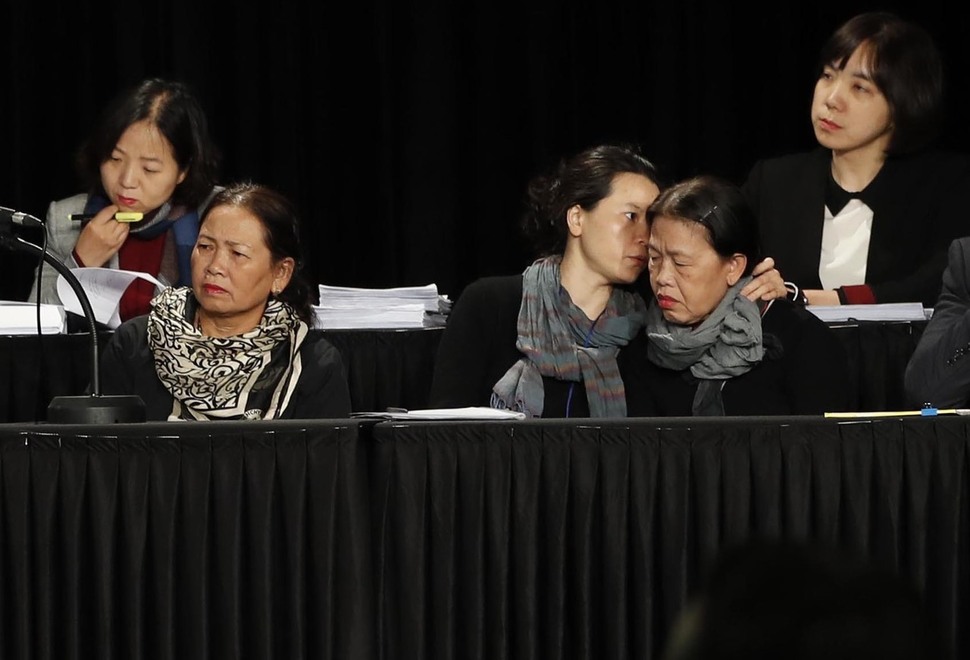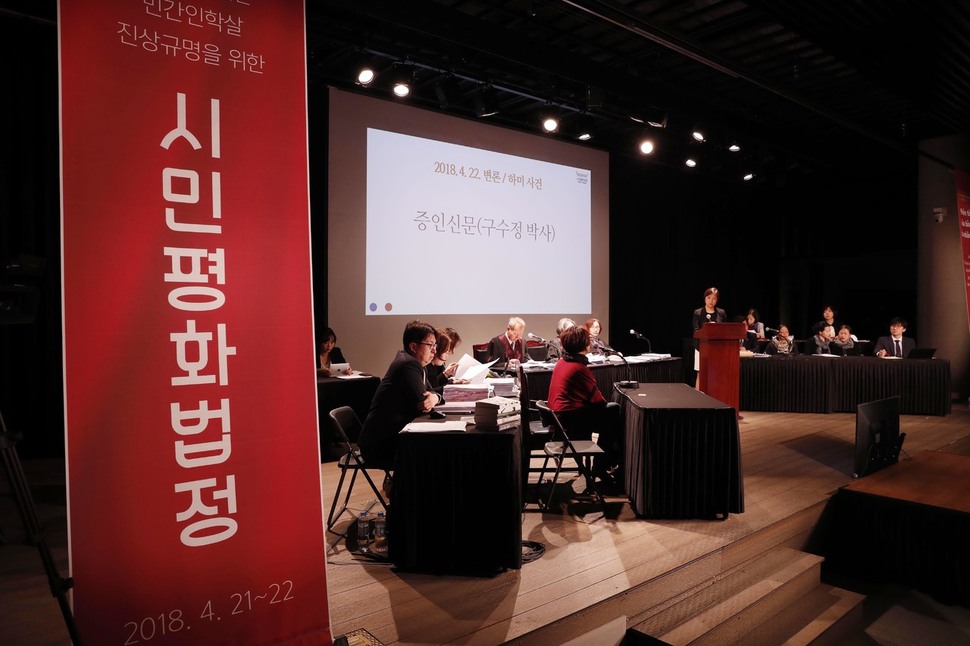 |
|
Nguyen Thi Thanh, a survivor of a massacre perpetrated by South Korean soldiers during the Vietnam War attends a citizens’ tribunal to discover the truth about the incident that was held at the Oil Tank Culture Park in Seoul’s Mapo district on Apr. 22. (by Park Jong-shik, staff photographer)
|
Non-binding citizens’ tribunal orders compensation to surviving family members
“Over 70 civilians were killed, and it is extremely questionable whether this can really be seen as an ‘unavoidable sacrifice’. . . . There are reasonable suspicions that civilian massacres by South Korean troops took place throughout their entire deployment period during the Vietnam War. . . . It is ordered that the Republic of Korea should pay compensation to the plaintiffs in accordance with the standards of the State Compensation Act and formally apologize so that the dignity and reputation of the plaintiffs may be restored.” Nguyen Thi Thanh, 58, let out a light sigh as the court read out its sentence at 5 pm on Apr. 22 following a two-day mock trial on civilian massacres during the Vietnam War. A broad smile came across her previously stern face. The ruling awarding her compensation came 50 years to the day after she had lost five of her family members. “I’m shaking all over,” Nguyen said. “I’m going to go back to Vietnam with good news. I think it may be able to ease at least a little of the suffering for the other victims.” A two-day citizens’ tribunal was held on Apr. 21 and 22 at Oil Tank Culture Park in Seoul’s Mapo district to examine the truth of civilian massacres by South Korean troops during the Vietnam War. Two women both named Nguyen Thi Thanh – one a 60-year-old victim from the village of Ha My where investigations showed South Korean soldiers to have taken 135 lives, the other a 58-year-old resident of the village of Phong Nhi/Phong Nhat where 74 people were killed – visited South Korea as plaintiffs in the suit demanding state compensation. In their case, they demanded an investigation and the payment of compensation from the South Korean governments for losses to themselves and their family members. As a mock trial, its decision has no binding force; the event itself was organized to urge a public debate on the issue of massacres of Vietnamese civilians. The judges in the citizens’ tribunal – including former Supreme Court Justice Kim Young-ran, attorney and former Sewol ferry sinking special investigation committee head Lee Seok-tae, and Seoul National University law professor Yang Hyun-ah – sided with the plaintiffs on most of their claims. After first acknowledging based on victim testimony that over 200 civilians were killed in the two villages, the judges demanded that the South Korean government pay compensation and formally apologize to the two plaintiffs. Attorneys from the group MINBYUN-Lawyers for a Democratic Society represented the Republic of Korea, which declined a summons to appear as a defendant. The state representatives argued that the deaths were “unintended sacrifices occurring in guerrilla warfare conditions where the enemy and friendly forces were difficult to distinguish.” But the court concluded that they represented “deliberate massacres,” noting that “most victims were senior citizens, children, and women.” The judges also recommended an investigation into all illegal actions against civilians during the period of South Korean troops’ involvement in the war from 1964 to 1973. Stressing the “need to ensure that the truth of the human rights violations is shared with future generations,” they ruled that the investigation outcome should be displayed at the War Memorial of Korea in Seoul’s Yongsan district or another exhibition space related to South Korean troops’ involvement in the war. “We must honestly reveal and confront the unfortunate facts of the past, sharing the truth and providing both comfort and reasonable healing measures,” Lee Seok-tae declared on the morning of Apr. 21 by way of announcing the opening of the first day of the citizens’ tribunal. This was followed by a video shown in court with accounts from a South Korean soldier who was fighting at the time of the Phong Nhi/Phong Nhat massacre. “A veteran soldier shot an old man who was pleading for his life,” the soldier recalled. “This is not the spirit of a soldier.” Fifty-eight-year-old Nguyen Thi Thanh testified about her experiences in Phong Nhi/Phong Nhat as an eight-year-old girl. On Feb. 12, 1968, she suffered a gunshot wound to her stomach. Her older brother’s hip and younger brother’s mouth were also maimed, she recalled.
 |
|
The citizens’ tribunal to discover the truth about civilian massacres by South Korean soldiers during the Vietnam War opens at the Oil Tank Culture Park in Seoul’s Mapo district on Apr. 22. (by Park Jong-shik, staff photographer)
|






